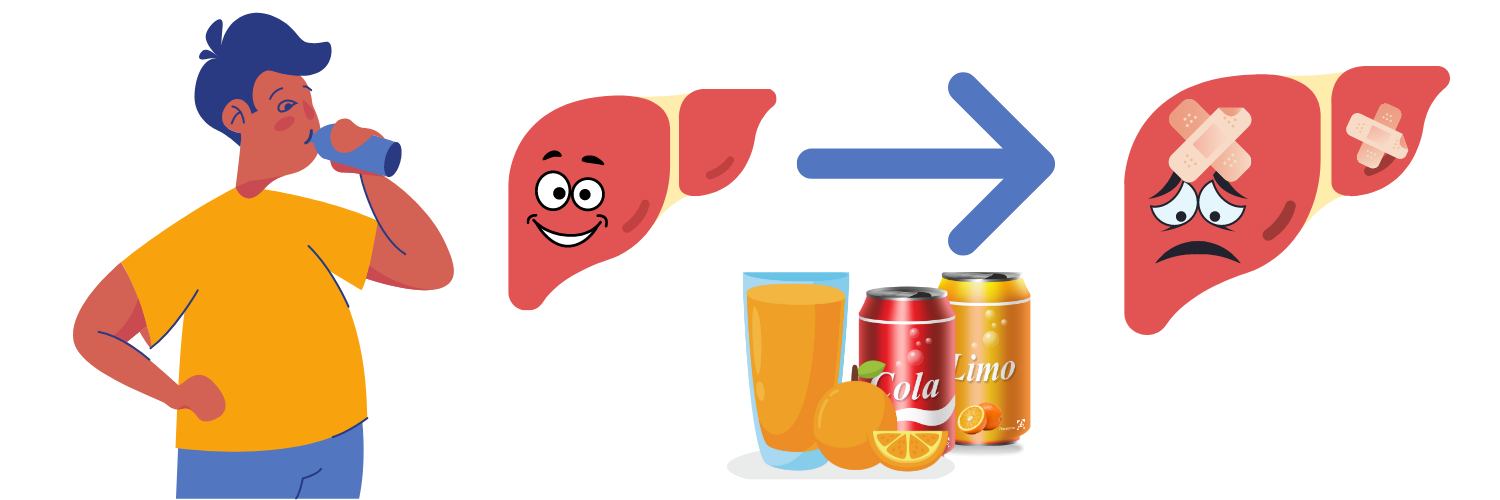Is your DRINKING harming your liver?

Blog image created with Canva
I don't mean alcoholic beverages (though it IS known that heavy lifetime consumption can lead to cirrhosis). And I don't mean regular coffee or tea either (contrary to certain religious denominations proscription of them). I mean SUGAR SWEETENED BEVERAGES, whether sweetened with sucrose or High FRUCTOSE Corn Syrup (HFCS).
Fructose has three destinations, two of which occur in the liver.
- Some is used by the brush border cells of the small intestine or converted there into glucose.
- Some gets channeled to replenishing hepatic glycogen stores, which are usually 300-500 g, and on the Sh**y American Diet are usually always full.
- MOST gets converted to fatty acids and assembled into triglycerides, which then form lipid droplets in the hepatocytes while they WAIT to be exported in VLDL particles for delivery to the adipose tissues for storage, and/or to energy hungry tissues like the heart and kidneys.
While waiting for EXPORT, those lipid droplet engorde hepatocytes produce FATTY LIVER.
Earlier this century, I and other MDs started seeing abdominal ultrasound reports commenting on the presence of FATTY LIVER.
Most, including myself, didn't understand the significance of it. I was even told it was becoming a common finding. I recall hearing some suggestion it was a result of improved machines producing higher resolution images (which doesn't make much sense, since the fatty tissue is less dense than that with a lower lipid to water ratio - which helps see smaller features).
Now FATTY LIVER has become so common that radiologists often don't bother mentioning its presence. It is almost as if the "normal" liver is now a "fattty liver". It isn't normal. Have a read of the abstract of the paper linked below, and if interested, you can read the whole paper.
- Beverages influence NAFLD-linked lipogenesis, β-oxidation, inflammation & fibrosis.
- Sugar-sweetened beverages are likely to be key driving factors of NAFLD.
- Regular coffee and tea intake reduces metabolic burden and NAFLD prevalence.
- Impact of alcoholic beverages on NAFLD and associated disorders is discussed.
- Lifestyle modifications and nutritional approaches are desirable to mitigate NAFLD.
Summary
Beverages and Non-alcoholic fatty liver disease (NAFLD) both the terms are associated with westernized diet and sedentary lifestyle. Throughout recent decades, dietary changes have boosted demand of beverages to meet the liquid consumption needs, among which rising consumption of several calorie-rich beverages have increased the risk of fatty liver disease. Meanwhile, certain beverages have capacity to deliver many unanticipated health benefits thereby reducing the burden of NAFLD and metabolic diseases. The present review therefore addresses the increasing interconnections between beverages intake among population, dietary patterns and the overall effect of these beverage on the development and prevention of NAFLD.
In the present review, some frequently consumed beverage groups have been analyzed in light of their role in the advancement and prevention of NAFLD, including sugar sweetened, hot and alcoholic beverages. The nutritional composition of different beverages makes the progression of NAFLD distinctive.
The ingestion of sugar-rich beverages has demonstrated the metabolic burden and in all cases, raises the risk of NAFLD, while intake of coffee and tea has decreased this risk without any significant adverse effects. In some cases, low to moderate alcohol intake has been shown to minimize the risk of advanced fibrosis and NAFLD-mortality.
Together, this review discusses and supports work on new dietary approaches and clinical studies to accomplish nutrition-oriented NAFLD care by improving the drinking habits.
Beverages and Non-alcoholic fatty liver disease (NAFLD): Think before you drink
Written by Dr. Lance De Foa, MD
Published November 13th, 2021